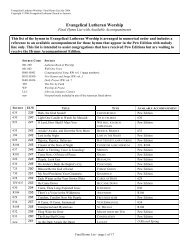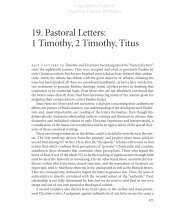Chapter 1 - Augsburg Fortress
Chapter 1 - Augsburg Fortress
Chapter 1 - Augsburg Fortress
You also want an ePaper? Increase the reach of your titles
YUMPU automatically turns print PDFs into web optimized ePapers that Google loves.
20 | Eros and the Christ<br />
increases and, as Laberius, after his own manner and in his own<br />
peculiar style, says of love, “Your love (amor) as fast as any onion<br />
grows, as firm as any palm.” This then is what he says of love (de<br />
amore), I apply to my longing (desiderium) for you. 39<br />
Laberius likely meant his lines for the praise of bride and groom. 40 Marcus’s<br />
redeployment of them amplified his friendship with amor and transfigured the<br />
teacher and friend into his longed-for Fronto. 41<br />
Fronto, however, took a cooler approach toward Marcus. He used letters<br />
to increase friendship to be sure, as epistolary theory required, but he did so<br />
without the eroticism of poetic allusion. Preferring philosophy to poetry and<br />
reason to emotion, Fronto creates a better friend, a figure less romantic than the<br />
parted lover Marcus had invented for Fronto.<br />
I have received your letter, most charmingly expressed, in which<br />
you say that the intermission in my letters has caused a longing for<br />
them to arise in you. Socrates was right, then, in his opinion that<br />
“pleasures are generally linked to pains,” when in his imprisonment<br />
he held that pain caused by the tightness of his chains was made<br />
up for by the pleasure of their removal. Precisely so in our case the<br />
fondness which absence stimulates brings as much comfort as the<br />
absence itself causes affliction. For fond longing comes from love.<br />
Therefore, absence makes the heart grow fonder, and this is far the<br />
best thing in friendship. 42<br />
From Fronto’s perspective, then, what the epistolary situation of their separation<br />
calls for is philosophic theory about balanced pleasure and pain, not poetically<br />
expressed erōs. 43 Yet, in their early correspondence, Fronto was swimming<br />
against the strong current of Marcus’s longing.<br />
Marcus’s use of Laberius indicates how important poetry was for the<br />
introduction of erōs into letters of friendship. While Laberius was a minor<br />
player, Sappho’s influence on longing letters was immense. The pseudonymous<br />
letter of Julian to Iamblichus opens with two Sapphic quotations. The first<br />
nicely states the letter’s promise of presence: “‘’Thou hast come! well hast thou<br />
done!’ You have indeed come, even though absent, by means of your letter. .<br />
. .” In the second we see once again the double effect of the letter to comfort<br />
and to reinvigorate longing: “‘And I was yearning for thee, and thou didst set<br />
ablaze my heart, already aflame with longing (καιομέναν πόθῳ) for thee.’” 44<br />
Sappho helped Julian create an amatory narrative within the letter for himself




